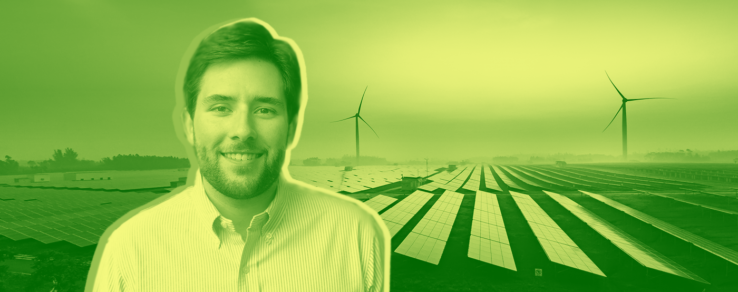Matthew Allen is the Senior Key Accounts & Business Analyst for ElectriCities of NC and acts as a guide for their municipal utilities. ElectriCities of NC provides administrative, technical, legal and legislative services to municipal electric utilities throughout North Carolina, as well as some in South Carolina and Virginia. Working with 32 member utilities, Allen helps their commercial and industrial (C&I) customers become more energy efficient and save on utility costs.

Between performing energy audits, encouraging C&I customers to participate in load management programs and helping other member utilities establish or improve their Key Accounts programs, one could say Allen keeps busy.
Allen is a homegrown advocate of ElectriCities, starting his career as an intern during college. He was born and raised in Lexington, North Carolina, and graduated from the University of North Carolina. After college, he applied for a full-time role with ElectriCities and has been with the company ever since. Outside of work, Allen enjoys golf and spending time with family, including his Golden Retriever, Summit.
For Allen, focusing on customer service and the customer experience is always top-of-mind. “In general, a lot of utilities focus on keeping the lights on,” he says. “While this has been the main priority for years, improving the overall customer experience should be an important consideration as we move into the future. All customers have different needs. It’s important for us to listen and identify ways that we can provide value beyond simply keeping the lights on.”
Questline Digital connected with Allen to get his thoughts on changes in the industry, the evolution of energy and advice for those entering the utility space.
How did you get started in the energy utility industry?
I began working at ElectriCities as an intern my sophomore year at UNC Charlotte. My role was year-round and I averaged working about 20 hours per week while in school full-time studying industrial engineering. Once I graduated, a position opened that I was interested in, so I applied. I have been in my current role for almost four years.
What has changed the most about your job working in the utility industry over the course of your career?
In my role, I work closely with our business customers advising them on energy efficiency opportunities. Over the past seven years, I would say newer technologies are allowing customers to reduce electric costs and become more energy efficient more easily than before. And the price of some of these technologies is continuing to decline. LED lighting is a good example of this. I also think the utility industry is beginning to focus more on customer service and the overall customer experience due to more competition. It is fun being a part of this transition.
What excites you the most about the energy utility space?
Electricity is something that impacts everyone. Most everyone uses electricity daily. I enjoy helping folks gain a better understanding of how they use energy and ways they can become more efficient and reduce electric costs. The entire process from energy generation to getting it to the end use customer intrigues me, so it is fun learning more and more about the industry beyond my specific role.
Tell me about the campaign or initiative you’re most proud of.
Over the previous year, we have begun working on some short videos that our members can share with their customers. These videos are targeted toward a variety of different business customers to help them better understand different aspects of electricity usage and utility billing. One of these was a five-minute video that explains energy consumption and peak demand for billing. While we have currently only produced three videos, we have plans for more in the queue.
What’s a marketing campaign you wish you’d thought of, inside or outside the energy industry?
This is not something that I have put a ton of thought into, but I’d say any campaign that can simply explain complex issues and topics to help customers better understand aspects of the industry, such as why utilities charge for peak demand and why conserving energy during peak periods is important. In addition to financial incentives, if customers better understand why certain programs are offered, they can participate more effectively.
What is the hardest part of working in the energy industry today?
I’d say competition is one challenge everyone in the energy industry faces. Municipal utilities, co-ops and investor-owned utilities all have different business models, although they all provide the same product, which is electricity to retail customers. So, it is important to highlight your strengths while also addressing your weaknesses and working to improve those.
Finish this sentence: If I weren’t working with energy key accounts, I would be…
That is a good question. I can’t really see myself working in a different industry. If I wasn’t in a key accounts role, I think I would enjoy working in the operations department or possibly project management.
What is your favorite eNewsletter?
Questline Digital has produced a lot of good content. In general, videos and articles with seasonal checklists tend to be my favorite. It’s easy to forget about everything you need to do to your HVAC system to prepare it for the cooling season during early spring when it has been months since it was regularly used. Seasonal checklists such as this also help me out by providing timely reminders when performing energy audits at different times throughout the year.
How do you anticipate the world of energy evolving in the coming years?
Over the coming years, I believe we are going to continue seeing more and more distributed generation from things like batteries, solar and other small generators as businesses continue to adopt green initiatives. From the utility perspective, it will be a challenge to determine how to best provide reliable power while also meeting the needs of customers. I look forward to helping solve the complex challenges.
What advice would you give to those entering the utility space?
Don’t be afraid to ask questions and don’t feel like you have to be an expert on everything. If a customer asks you a question that you don’t know the answer to, tell them you will find out and follow up with them.

